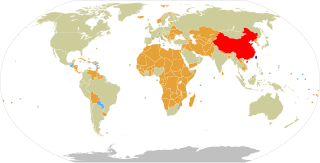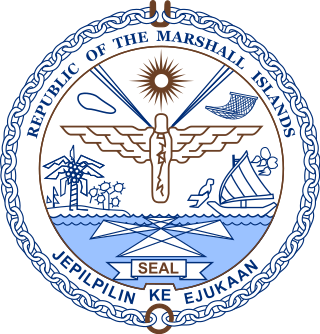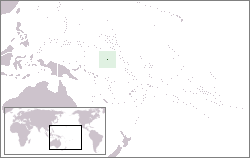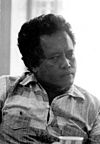
The current political regime in Angola is presidentialism, in which the President of the Republic is also head of state and government; it is advised by a Council of Ministers, which together with the President form the national executive power. Legislative power rests with the 220 parliamentarians elected to the National Assembly. The President of the Republic, together with the parliament, appoints the majority of the members of the two highest bodies of the judiciary, that is, the Constitutional Court and the Supreme Court. The judiciary is still made up of the Court of Auditors and the Supreme Military Court.

Palau, officially the Republic of Palau, is an island country in the Micronesia subregion of Oceania in the western Pacific Ocean. The republic consists of approximately 340 islands and connects the western chain of the Caroline Islands with parts of the Federated States of Micronesia.

The politics of Palau take place in a presidential representative democratic republic, whereby the President of Palau is both head of state and head of government. Palau currently has no political parties and is a de facto non-partisan democracy although there is no law preventing the formation of political parties.

Foreign relations of the Republic of China (ROC), more commonly known as Taiwan, are accomplished by efforts of the Ministry of Foreign Affairs of the Republic of China, a cabinet-level ministry of the Government of the Republic of China. As of January 2024, the ROC has formal diplomatic relations with 11 of the 193 United Nations member states and with the Holy See, which governs the Vatican City State. In addition to these relations, the ROC also maintains unofficial relations with 59 UN member states, one self-declared state (Somaliland), three territories (Guam, Hong Kong, and Macau), and the European Union via its representative offices and consulates. In 2021, the Government of the Republic of China had the 33rd largest diplomatic network in the world with 110 offices.

Thomas Esang "Tommy" Remengesau Jr. is a Palauan politician. In 2013, he was elected the ninth president of Palau and was re-elected to that office in 2016. Previously he served as the seventh president of the island nation from 2001 to 2009. He served as a Senator in the Palau National Congress between his two administrations. In sum, Remengesau was elected Vice-President of Palau in 1992 and 1996, then president in 2000, 2004, 2012 and 2016.

The University of the South Pacific (USP) is a public research university with locations spread throughout a dozen countries in Oceania. Established in 1968, the university is organised as an intergovernmental organisation and is owned by the governments of 12 Pacific island countries: the Cook Islands, Fiji, Kiribati, Marshall Islands, Nauru, Niue, Samoa, Solomon Islands, Tokelau, Tonga, Tuvalu and Vanuatu.

Thomas Ongelibel Remengesau, also known as Thomas Remengesau Sr., was a politician in Palau. He was Vice President of Palau from 1985 to 1988, and acting President of Palau in 1985 and President of Palau from 1988 to 1989 following the violent deaths of two previous presidents.
Age of candidacy is the minimum age at which a person can legally hold certain elected government offices. In many cases, it also determines the age at which a person may be eligible to stand for an election or be granted ballot access.

The president of the Republic of Palau is the head of state and head of government of Palau. The president is directly elected to a four-year term, and can be reelected once in a consecutive manner.

The Senate of Palau is the upper house of the Palau National Congress. The Senate has 13 members serving four-year terms in multi-seat constituencies. Since Januaru 2025, the Senate has 15 members. No political parties exist. The most recent election was held on November 2024.
The ages of consent for sexual activity vary from age 15 to 18 across Australia, New Zealand and other parts of Oceania. The specific activity and the gender of its participants is also addressed by the law. The minimum age is the age at or above which an individual can engage in unfettered sexual relations with another person of minimum age. Close in age exceptions may exist and are noted where applicable. In Vanuatu the homosexual age of consent is set higher at 18, while the heterosexual age of consent is 15. Same sex sexual activity is illegal at any age for males in Papua New Guinea, Kiribati, Samoa, Niue, Tonga and Tuvalu; it is outlawed for both men and women in the Solomon Islands. In all other places the age of consent is independent of sexual orientation or gender.

The government of the Marshall Islands operates under a mixed parliamentary-presidential system as set forth in its Constitution. Elections are held every four years in universal suffrage, with each of the 24 constituencies electing one or more representatives (senators) to the lower house of RMI's unicameral legislature, the Nitijela. The President, who is head of state as well as head of government, is elected by the 33 senators of the Nitijela. Four of the five Marshallese presidents who have been elected since the Constitution was adopted in 1979 have been traditional paramount chiefs.

Ageism is a type of discrimination based on one's age, generally used to refer to age based discrimination against elderly people. The term was coined in 1969 by Robert Neil Butler to describe this discrimination, building on the terminology of sexism and racism. Butler defined ageism as a combination of three connected elements: negative attitudes towards old age and the ageing process, discriminatory practices against older people, and institutional practices and policies that perpetuate stereotypes about elderly people.

The vice-president of Kiribati is the deputy head of State of the Republic of Kiribati. His or her constitutional functions are to exercise the duties of the President of Kiribati, temporarily or permanently, should the latter be unable to do so, and to "be responsible for such business of the government as the Beretitenti [President] may assign to him".

Lesbian, gay, bisexual, and transgender (LGBT) people living in Nauru may face legal and social challenges not experienced by non-LGBT residents. Same-sex sexual activity has been legal since May 2016, but there are no legal recognition of same-sex unions, or protections against discrimination in the workplace or the provision of goods and services.

The gambling age is an aspect of gambling law — the minimum age at which one can legally gamble in a certain jurisdiction. In some countries, gambling is illegal regardless of age, while some countries have different age limits for different types of gambling, and some countries have no explicit minimum gambling age.

Temmy L. Shmull is a Palauan politician who served as Governor of Peleliu for 3 terms from January 2013 to January 2022. He previously served as the Minister of State of Palau from 2001 to 2009 and was also the vice president of Palau National Olympic Committee.
Sabino Anastacio is a Palauan politician who has been speaker of the House of Delegates of Palau since January 2013.

























